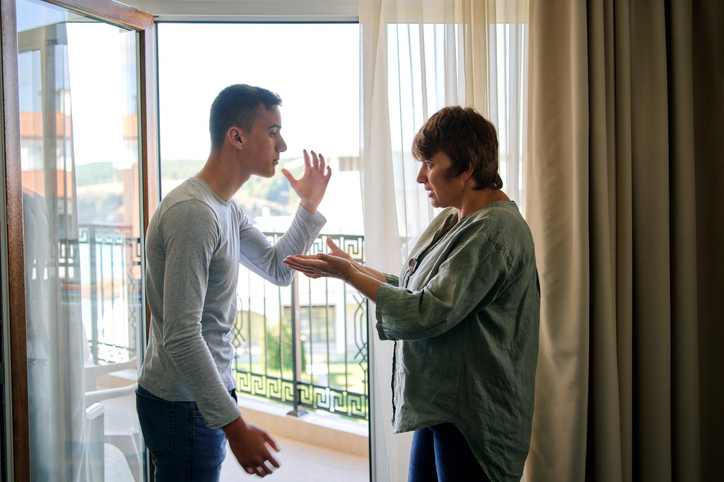When adult children cut their parents out of their lives, it’s painful for everyone. It’s also something many parents don’t understand, but if you don’t want to become estranged from your own kids, it’s important to take steps to ensure it doesn’t happen. By stopping these bad habits, you could even form closer, healthier relationships with your kids.
1. You second-guess their decisions.

People make decisions based on their core values and beliefs. If you’re always second-guessing your adult child’s decisions, you’re passive-aggressively judging their ability to tell right from wrong. Disrespecting their values is one of the top reasons estrangement happens in families. Instead, support what they do or hold back negative comments to give them room for individuality.
2. You visit them without asking.

If someone repeatedly showed up at your house while you were busy, it would get annoying pretty quickly. You’d want them to respect that you have other responsibilities to handle. It’s not personal. Your adult child will feel the same frustration if you show up in their life without scheduling visits or calls first.
3. You tell them how to dress better.

When your child was young, you got to choose what clothes they wore because you had financial control over their life. That’s different now. If you’re criticizing your child’s clothes and telling them how to look better, it tells your adult child that you don’t respect their individual identity. They want an adult relationship with you, not the same dynamic you shared when they were five.
4. You speak to your adult child’s friends constantly.

It’s difficult to find a respectful distance when you easily connect with your adult child’s friends. You might think sharing friends makes you closer to your child, but it makes your child feel like you’re stealing their social life. It could also disrupt their friendships if your child’s friends start to resent them because your presence is irritating.
5. You dismiss their feelings.

Generational jokes about young people being too sensitive aren’t funny or clever. They tell your child that you aren’t concerned about their emotional well-being. Dismissing their feelings due to their age, beliefs, values or any other factor makes them feel like they aren’t safe to be vulnerable around you.
If you’re unsure whether you do this, watch for common comebacks like your child saying that they appreciate your perspective, but it doesn’t change how they feel. You could also ask if they ever feel emotionally disregarded if you’re ready to potentially take responsibility and change things for the better.
6. You expect apologies but don’t make them.

People don’t want to spend time with their parents when those parents can’t take responsibility for their mistakes or the harm they cause. It makes adult children feel like their parents don’t love them enough to work equally on their relationship. Your child might leave you to spend time with people who don’t need to protect their ego at the expense of their relationship.
7. You call them a kid.

Your adult child will always be your child, but they’re also an adult now. Refusing to accept that they are a grown person with their own identity belittles them, making your adult child want more distance. Try calling them your child on rare occasions to better support them at this stage of your lives.
8. You make mean comments about people like them.

Consider how often you say offensive comments and which communities you’re degrading. Your child might share something in common with that community, whether you know it or not. Hearing you disrespect people like them is frustrating. Your adult child won’t feel safe to be their authentic self around you, and even avoid you if they want to protect their self-worth.
Remember, there are many different ways to say something offensive. If your adult child asks you to stop and you respond with sarcasm, it’s a clear sign you’re being passive-aggressive. Sarcasm makes it easy to avoid your responsibility and start changing. If things never get better, your child won’t want to spend time with you.
9. You push your beliefs on them.

Parents often push their beliefs onto their adult children, whether they’re spiritual beliefs or anything else. This behavior is another form of treating your adult child like a little kid. They’re an adult. It’s their job to evaluate what they believe and which values matter to them. Pushing them into your belief system will only make them feel suffocated and disrespected.
10. You treat your child like a therapist.

Sometimes, parents recognize that their child is an adult and start treating them like a best friend. The parent may frequently vent about their personal and work problems, but not listen to their child in return.
This is frustrating for the adult child in numerous ways. They’ll feel taken advantage of when you ignore their advice or refuse to listen to their vent sessions in return. No one can stay in a relationship forever when only one person feels emotionally valued.
11. You never remember what they say.

Consistently forgetting what your adult child tells you is hurtful, whether they tell you something big or little. It shows them that what your child says isn’t important enough for you to remember. Even if that’s not true for you, it’s another way your actions speak louder than words.
This is a form of emotional neglect, which is traumatic. Unresolved or repeated trauma drives people away from their parents because they eventually need to heal more than they need you.
12. You push them to break their boundaries.

Many parents don’t respect their adult child’s boundaries because they think that their child should always prioritize their needs. It’s what you did for your parents, so why shouldn’t your child do the same for you?
In reality, the lack of personal boundaries erodes the relationship. Imagine your child saying they won’t come home every weekend anymore because it’s too much traveling. They’ll visit you twice a month instead.
You might support that initially, then wonder when things will go back to the way you preferred them. You start pushing them to come visit every weekend, saying how upset you are about the new schedule or how lonely they’re making you feel. It’s disrespectful of your adult child’s life and their ability to set gentle, healthy boundaries. It might make them want more extreme boundaries instead, like cutting themselves off from you.
13. You frequently bring up trauma from your shared past.

Parents sometimes joke about their adult child’s family trauma. They complain that their adult child was just an emotional teenager or a needy kid. Every time this happens, the adult child gets reminded that their pain isn’t valid. It opens old wounds they have to constantly heal by themselves. Your adult child might dread talking with you because they don’t want their trauma dismissed with jokes.
14. You share private information about their life.

You might enjoy gossiping with your friends because it creates greater bonds to connect over things you both find shocking, entertaining or crazy. Chasing that enjoyable feeling might lead to posting things on social media or texting friends about your child, but that can cross a line because it shows you don’t care about your adult child’s privacy.
Sharing things your adult child tells you in confidence breaks their trust. If you do that on social media, it adds public shaming to your child’s painful mix of emotions. Breaking that trust repeatedly will make your child want to spend less and less time with you.
15. You try to parent your adult child’s kids against their wishes.

Parents might unknowingly parent their grandkids. It’s a natural instinct from years of raising your own children, but your adult child brings their unique perspective to their parenting preferences. It’s disrespectful to go against the parenting style they set for your grandkids.
This habit may also drive your adult child away faster if you’re repeating behavioral patterns that harmed them as a child, like emotional neglect. They’ll pull away from you if they see their child starting to suffer from the same things that harmed them.
Enjoy this piece? Give it a like and follow PsychLove on MSN for more!




